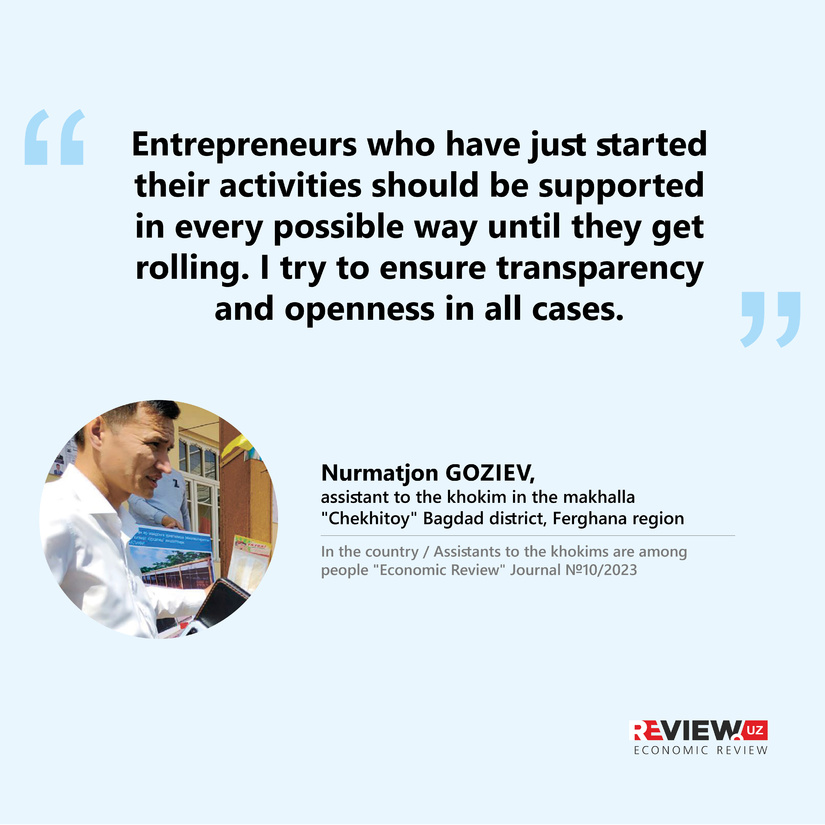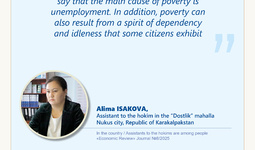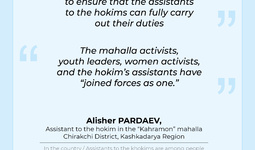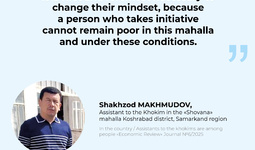— In our country, the "makhallabay" system was introduced for the first time. What is the nature of this position for you, how do you see and understand it?
— The makhallabay system of work, established at the initiative of the President, is aimed at studying and solving the problems of the population on the spot, and today it literally becomes a bridge between the leaders and the people. I will not be mistaken if I say that as a result, every makhalla creates all the conditions for citizens to find their place in society. Our main goal is the comprehensive development of the makhalla, increasing the trust of our people by solving the problems of the population. I am glad that I took part as one of the first participants in an important project for Uzbekistan.
— Tell us more about yourself and how you came to this position. How much did you previously know about the work of the makhalla, where you are now an assistant to the khokim? What is your past work experience that allows you to solve the tasks assigned to the assistant to the khokim?
— I was born here, my childhood passed here. I am currently studying at the Faculty of Economics of Ferghana State University. Prior to taking this position, I was the head of Zolotaya Dolina LLC. Of course, the fact that I was engaged in entrepreneurship helped me to some extent and was useful to me in my new activity. Because an entrepreneur meets and communicates with many people, gets acquainted with their lives.
— Tell us in detail about your makhalla. Where is it located, in the village or in the city, what is its size, what are the large enterprises, what types of activities are local people engaged in?
— The "Chekhitoy" makhalla attached to me is located 20 km from the district center. There are 503 houses in the makhalla, in which more than 2,200 people live. There are no large industrial enterprises on the territory. Residents of the makhalla are mainly engaged in agriculture, animal husbandry, as well as handicrafts. For example, the cultivation of brooms and washcloths is well established, as well as the manufacture of various marketable goods from them. This is what most households do.
— Which social groups of the population make up the majority, is it possible to show the "social portrait" of your makhalla in numbers? How did you start your work?
— I started my work as an assistant to the khokim by conducting a number of studies and surveys in the makhalla. Through the census, studies were conducted on the social status of families, the level of use of household plots, the determination of the desire to engage in entrepreneurship. As a result, a roadmap was developed to work with 296 households of the first, second and third categories and increase their incomes. Basket making and pepper production were named as the "drivers" of the makhalla economy. The goal was to train able-bodied citizens in households in professional or entrepreneurial skills, and then provide them with equipment so that they could earn income. It was determined that 130 citizens are unemployed in the mahalla. The state of the region's infrastructure was also studied and the necessary tasks in these areas were identified. 77 citizens included in the "Women's Notebook" and "Youth Notebook" were allocated 12 hectares of arable land, they were registered as self-employed persons.
— What methods have you used in your work to support poor households? Give examples and describe in detail the results of working with these households.
— First of all, we decided to make effective use of the opportunities available in the makhalla. Traditionally, residents of the region are engaged in the cultivation, manufacture and sale of brooms. Based on this, measures were taken to expand this direction. With the support of leading entrepreneurs, the production of brooms in households has been expanded and their export has been established. This year, it is planned to deliver brooms worth $1 million abroad. In particular, Golden Valley LLC, located in the Baghdad district, has established the export of handicrafts, including baskets and buckets. We intend to further expand this work.
Citizens who were previously engaged in greenhouse farming and want to expand their business were allocated preferential loans. They were also provided with the necessary seedlings and fertilizers. Comprehensive assistance is provided to citizens wishing to conduct business in the makhalla. For example, Lazizbek Botiraliev, a resident of the makhalla, was granted a preferential loan to organize the production of knitwear at home. Thanks to this, several women of the makhalla were also provided with work. Also, 7 citizens living in the makhalla were allocated loans in the amount of 399.4 million sums for sewing, greenhouses and animal husbandry. Currently, 24 citizens are being trained in new professions and entrepreneurship. In addition, subsidies were allocated to 20 families.
— What else do you think needs to be done to reduce the level of poverty in the makhalla?
— In my opinion, it is necessary to organize vocational training centers and mono-centers among three or four makhallas in the shortest possible time. Here, on the recommendation of the assistants to the khokims, citizens living in the makhalla who want to master or acquire a new profession should be trained.
Another suggestion is that it is necessary to establish the sale of products grown on the lands transferred to the population to the domestic and foreign markets. And in the direction of export, it would be advisable to work in cooperation with the Ministry of Investment and Foreign Trade.
It is also necessary to pay special attention to promising projects proposed by the assistants to the khokims, to provide benefits in tax, cadastral and credit issues. Entrepreneurs who have just started their activities should be supported in every possible way until they get back on their feet. In addition, banks can provide loans by opening a card in the name of the citizens themselves. It will be cheaper for the people, and control over this can be entrusted to the assistant of the khokim.
— Tell us about new projects.
— Currently, 10 thousand buckets are sent monthly to trading partners in St. Petersburg. 500 baskets were also prepared by mutual agreement. At the same time, an order for 7 thousand baskets was received from abroad. For the development of basket weaving, first of all, it is necessary to create a raw material base. It is expected that a total of 10 hectares of land will be allocated by the state to the residents of our makhalla to create farms. We intend to plant cuttings of American and Chinese willow on these lands. So, by developing basket weaving in the makhalla, it is possible to create an additional source of income for at least 100 households.
Using the available opportunities, construction of 90 light-weight retail outlets has begun on empty lands along the Andijan-Osh highway passing through the makhalla. More than 180 people are provided with work here. These outlets also sell products made in the makhalla itself. We plan to further expand our work in this direction.
In order to reduce unemployment and reduce the share of informal employment, a beekeeping cooperative was established in the "Chekkhitoy" makhalla of the Baghdad district. Thanks to this, the employment of unemployed members of 20 families was provided. In short, the available opportunities are used effectively.
— Today in our country there is a fierce struggle against any forms of corruption. What do you do in your activities to prevent corruption?
— I try to ensure transparency and openness in all matters in order to avoid situations related to corruption in our makhalla. We have involved activists and elders of the makhalla, deputies in the work and divided the population into categories, developed together with them the procedure for conducting constant monitoring, reporting to the people. Field receptions and legal consultations are held in the makhalla together with the head of the sector, the people's reception and law enforcement agencies. It is these events that serve to raise the legal awareness of the population and prevent corruption.
— What has changed in the makhalla during your activity? How do the residents feel about this? Have they strengthened their trust in the makhallabay system as a whole?
— I can say with confidence that the makhallabay system of work has made a great contribution to the creation of a New Uzbekistan. The fruits of the reforms can be seen in improving the life of the makhalla and the conditions for people. I am ready to use all my knowledge and experience for this. Of course, citizens who see positive results in their lives have confidence in the future.
Jamoliddin Turdimov, CERR
"Economic Review" Journal №10/2023





















leave a comment